Andrea Berthot's Blog
March 16, 2017
Dare We Dream #6
Here's Dare We Dream #6! The final chapter in my serialized short story for the Kansas Newspapers for Education. Enjoy!
Chapter Six “What did you think?” Frankie asked as she and Susan rose from their seats and joined the crowd flowing toward the lobby. “It was…” Susan bit her lip. “It was wonderful. And awful.” “Exactly,” Frankie exclaimed. “And now I don’t know what to think. About whether it should be banned or not, I mean.” “I know,” Susan said. “Before I thought every movie should be available to everyone, but after seeing something so cruel and untruthful…I’m not so sure.” They walked out onto the street and paused as the crowd spilled out around them. “Do you see a clock anywhere?” Susan asked, using her hand as a visor. “I think there’s one on a bank nearby,” Frankie said, scanning the crowd, but then she met the gaze of a Negro girl about her age who was coming out of the movie palace behind them with her mother. Time stilled as the knowledge of what they’d both just seen flowed between them, and Frankie froze, held captive by the pain in the other girl’s eyes. There was fear there too, and also something Frankie had never seen. She could only describe the emotion as what she imagined a scream might look like. It was desperate, aching, and full – like a dam about to burst – and then suddenly, she realized what it was. It was a story. This girl had a story inside her, a story that hadn’t ever been told. They’d both just witnessed a story about her people and her past, but neither she nor her people had told that story – white men had. The story wasn’t hers, and that’s what was screaming – her untold story – and Frankie now understood the true problem with The Birth of a Nation, and – in fact – the problem with the whole country and maybe the world.Everyone had a story, but not everyone got to tell it. The stories of the powerless either got twisted and skewed by the people in power or silenced and stamped out completely. The Birth of a Nation was terrible, but not as terrible as the crime of oppressing people’s stories, and it seemed to Frankie the argument over whether or not to ban The Birth of a Nation wasn’t the issue. Banning stories wouldn’t solve the problem; only allowing the silenced to finally tell their stories would. “There’s the clock. It’s after five,” Susan said, and Frankie turned back to her. “We’d better get to the station. If we catch the six o’clock train, we’ll make it back before Mamma for sure.” They took the next trolley and did arrive at Union Station in time. The sun began to set as they neared Lawrence an hour later, rocking along in their seats with the rhythm of the car. “Are you glad we went?” Frankie asked, as Susan had been quieter than usual since the film. She blinked, waking from thoughts Frankie couldn’t read on her face, but then she smiled and took her hand. “Yes, I’m glad,” she said. “I had a wonderful day with you.” Frankie smiled back. “Me too.” No matter what disturbing things she’d seen or learned that day, she was happy and grateful to have done it all with her sister. “I almost laughed at that final scene,” Susan said after a moment. “The one with the giant Jesus?” “Yes.” She chuckled. “It was so strange.” The final scene of The Birth of a Nationshowed a group of angelic-looking people – all white, of course – wearing flowers and flowing robes and dancing before a giant, superimposed image of Christ. The title card before it had read, Dare we dream of a golden day when bestial war shall rule no more. “You’re right. It was strange,” Frankie agreed. “The people in those robes looked like they were drunk. And also in Greece.”
Susan snorted and Frankie laughed too and rested her head on her shoulder. They continued on to Lawrence as the sun set over the plains, and after a while, Frankie found herself “daring to dream.” Not of drunken Greeks, but of a day when every person had the power to tell their own story. That would be the real birth of a just and equal nation.
Chapter Six “What did you think?” Frankie asked as she and Susan rose from their seats and joined the crowd flowing toward the lobby. “It was…” Susan bit her lip. “It was wonderful. And awful.” “Exactly,” Frankie exclaimed. “And now I don’t know what to think. About whether it should be banned or not, I mean.” “I know,” Susan said. “Before I thought every movie should be available to everyone, but after seeing something so cruel and untruthful…I’m not so sure.” They walked out onto the street and paused as the crowd spilled out around them. “Do you see a clock anywhere?” Susan asked, using her hand as a visor. “I think there’s one on a bank nearby,” Frankie said, scanning the crowd, but then she met the gaze of a Negro girl about her age who was coming out of the movie palace behind them with her mother. Time stilled as the knowledge of what they’d both just seen flowed between them, and Frankie froze, held captive by the pain in the other girl’s eyes. There was fear there too, and also something Frankie had never seen. She could only describe the emotion as what she imagined a scream might look like. It was desperate, aching, and full – like a dam about to burst – and then suddenly, she realized what it was. It was a story. This girl had a story inside her, a story that hadn’t ever been told. They’d both just witnessed a story about her people and her past, but neither she nor her people had told that story – white men had. The story wasn’t hers, and that’s what was screaming – her untold story – and Frankie now understood the true problem with The Birth of a Nation, and – in fact – the problem with the whole country and maybe the world.Everyone had a story, but not everyone got to tell it. The stories of the powerless either got twisted and skewed by the people in power or silenced and stamped out completely. The Birth of a Nation was terrible, but not as terrible as the crime of oppressing people’s stories, and it seemed to Frankie the argument over whether or not to ban The Birth of a Nation wasn’t the issue. Banning stories wouldn’t solve the problem; only allowing the silenced to finally tell their stories would. “There’s the clock. It’s after five,” Susan said, and Frankie turned back to her. “We’d better get to the station. If we catch the six o’clock train, we’ll make it back before Mamma for sure.” They took the next trolley and did arrive at Union Station in time. The sun began to set as they neared Lawrence an hour later, rocking along in their seats with the rhythm of the car. “Are you glad we went?” Frankie asked, as Susan had been quieter than usual since the film. She blinked, waking from thoughts Frankie couldn’t read on her face, but then she smiled and took her hand. “Yes, I’m glad,” she said. “I had a wonderful day with you.” Frankie smiled back. “Me too.” No matter what disturbing things she’d seen or learned that day, she was happy and grateful to have done it all with her sister. “I almost laughed at that final scene,” Susan said after a moment. “The one with the giant Jesus?” “Yes.” She chuckled. “It was so strange.” The final scene of The Birth of a Nationshowed a group of angelic-looking people – all white, of course – wearing flowers and flowing robes and dancing before a giant, superimposed image of Christ. The title card before it had read, Dare we dream of a golden day when bestial war shall rule no more. “You’re right. It was strange,” Frankie agreed. “The people in those robes looked like they were drunk. And also in Greece.”
Susan snorted and Frankie laughed too and rested her head on her shoulder. They continued on to Lawrence as the sun set over the plains, and after a while, Frankie found herself “daring to dream.” Not of drunken Greeks, but of a day when every person had the power to tell their own story. That would be the real birth of a just and equal nation.
Published on March 16, 2017 06:17
March 14, 2017
Dare We Dream #5
Here's Dare We Dream #5! The fifth chapter in my serialized short story, running Tuesdays and Thursdays in the Kansas Newspapers for Education. Enjoy!
Chapter Five Frankie’s heart pounded as she and Susan sat down in the plush, velvet seats of the movie palace. The downtown Kansas City theater was crowded, even the upper balcony reserved for the Negro patrons. The segregation itself was no particular surprise; though most of Lawrence was integrated, Liberty Hall – where movies were shown – also had a separate balcony for colored people. The thing that surprised Frankie was the fact that so many black people wantedto see The Birth of a Nation, especially since the NAACP had called for a boycott. But then, she and Susan had been forbidden to see it as well, and it only made sense that Negroes would want to see it for the same reasons, that they would also be curious and want to think for themselves. The house lights dimmed, a hush spread through the crowd, and Frankie’s heart stopped. When they’d boarded the train in Lawrence, Susan had said there was no turning back, but Frankie knew that this was really the point of no return. They’d planned so long and come so far to see what their parents and state had deemed to dangerous to see, and after they watched this film, Frankie knew they could never un-see it. A light flickered and then spread out across the massive screen, and Frankie took Susan’s hand. Susan squeezed her fingers back as the opening credits rolled and the movie palace’s organist began the sweeping score. At Liberty Hall, the music was played on a tinny, upright piano, and more than ever before Frankie found herself overwhelmed by the bellowing depth of the palace organ. After what seemed like forever, the credits finally came to an end, and the opening title card flashed up on the screen: The bringing of the African to America planted the first seed of disunion. Frankie tightened her grip on Susan’s hand. No going back now.*** When the screen went dark and the house lights came up, Frankie had one thought.Everyone on all sides of the argument had been right. In a way, The Birth of a Nation was everything everyone said. The film was the most advanced and breathtaking thing she’d ever seen. It was also, without a doubt, unrepentantly racially biased. Movies had made Frankie laugh before, but they’d never made her cry, and she’d cried when two characters – former friends – met on opposite sides of a battle and died in each other’s arms. In the past, fake buildings and outlandish getups had made movies seem artificial, but The Birth of a Nation’s sweeping landscapes, intricate costumes, and thrilling special effects had convinced her every scene before her was actually real. And not only real, but connected to her – the way the camera had often narrowed and closed in on the actors’ faces had made her feel their pain and longing as if it were her own.But at the same time, the movie’s story made her stomach turn. All the Negro characters – most of whom weren’t Negros at all but white actors in blackface – were portrayed as either stupid children or violent animals. They were happy as slaves and once they were freed they became like wild dogs – forcing white people out of voting booths at gunpoint, taking over every seat in the government, and marauding barefoot through the streets while drinking, destroying property, and hunting for white women. Frankie knew her parents and history teacher would have laughed, and at times she would have laughed herself if the idea that all Negroes were beasts – or that the Ku Klux Klan was a righteous band of heroes – wasn’t also sickening and terrifyingly wrong. But she still wasn’t sure who was right about banning the film. The movie was incorrect and immoral, but was it dangerous? Was it something the public shouldn’t see, or that shouldn’t exist at all? Everyone was always talking about the American right to free speech. Did the people who made the film have the right to say whatever they wanted, or could there be some stories too wrong and hateful to be told?
She’d finally seen the movie, but she still didn’t have her answer.
Chapter Five Frankie’s heart pounded as she and Susan sat down in the plush, velvet seats of the movie palace. The downtown Kansas City theater was crowded, even the upper balcony reserved for the Negro patrons. The segregation itself was no particular surprise; though most of Lawrence was integrated, Liberty Hall – where movies were shown – also had a separate balcony for colored people. The thing that surprised Frankie was the fact that so many black people wantedto see The Birth of a Nation, especially since the NAACP had called for a boycott. But then, she and Susan had been forbidden to see it as well, and it only made sense that Negroes would want to see it for the same reasons, that they would also be curious and want to think for themselves. The house lights dimmed, a hush spread through the crowd, and Frankie’s heart stopped. When they’d boarded the train in Lawrence, Susan had said there was no turning back, but Frankie knew that this was really the point of no return. They’d planned so long and come so far to see what their parents and state had deemed to dangerous to see, and after they watched this film, Frankie knew they could never un-see it. A light flickered and then spread out across the massive screen, and Frankie took Susan’s hand. Susan squeezed her fingers back as the opening credits rolled and the movie palace’s organist began the sweeping score. At Liberty Hall, the music was played on a tinny, upright piano, and more than ever before Frankie found herself overwhelmed by the bellowing depth of the palace organ. After what seemed like forever, the credits finally came to an end, and the opening title card flashed up on the screen: The bringing of the African to America planted the first seed of disunion. Frankie tightened her grip on Susan’s hand. No going back now.*** When the screen went dark and the house lights came up, Frankie had one thought.Everyone on all sides of the argument had been right. In a way, The Birth of a Nation was everything everyone said. The film was the most advanced and breathtaking thing she’d ever seen. It was also, without a doubt, unrepentantly racially biased. Movies had made Frankie laugh before, but they’d never made her cry, and she’d cried when two characters – former friends – met on opposite sides of a battle and died in each other’s arms. In the past, fake buildings and outlandish getups had made movies seem artificial, but The Birth of a Nation’s sweeping landscapes, intricate costumes, and thrilling special effects had convinced her every scene before her was actually real. And not only real, but connected to her – the way the camera had often narrowed and closed in on the actors’ faces had made her feel their pain and longing as if it were her own.But at the same time, the movie’s story made her stomach turn. All the Negro characters – most of whom weren’t Negros at all but white actors in blackface – were portrayed as either stupid children or violent animals. They were happy as slaves and once they were freed they became like wild dogs – forcing white people out of voting booths at gunpoint, taking over every seat in the government, and marauding barefoot through the streets while drinking, destroying property, and hunting for white women. Frankie knew her parents and history teacher would have laughed, and at times she would have laughed herself if the idea that all Negroes were beasts – or that the Ku Klux Klan was a righteous band of heroes – wasn’t also sickening and terrifyingly wrong. But she still wasn’t sure who was right about banning the film. The movie was incorrect and immoral, but was it dangerous? Was it something the public shouldn’t see, or that shouldn’t exist at all? Everyone was always talking about the American right to free speech. Did the people who made the film have the right to say whatever they wanted, or could there be some stories too wrong and hateful to be told?
She’d finally seen the movie, but she still didn’t have her answer.
Published on March 14, 2017 06:17
March 9, 2017
Dare We Dream #4
Here's Dare We Dream #4! The fourth chapter in my serialized short story, running Tuesdays and Thursdays in the Kansas Newspapers for Education. Enjoy!
Chapter Four The Kansas City Union Station was enormous, elegant, and – as usual – filled with people. The building had been completed only one year earlier, and it still seemed to sparkle with a sort of freshness as Frankie and Susan joined the crowd streaming beneath its arched ceilings and glimmering chandeliers. The six-foot diameter face of the Grand Hall clock read twelve thirty-five, so they hurried out the front entrance and caught a trolley to downtown KC. They weren’t exactly sure what times the movie was showing that day, and they needed to see the earliest show in order to make it back to Lawrence before their mother that night. The downtown movie palace, where they had often come with their parents and uncle, was also a new, lavish building that soared up into to the sky. The schedule on the ticket window listed the first showing of The Birth of a Nation at two, so since they were both hungry and had nearly an hour to kill, they hurried across the street to get some lunch at the Automat, dodging pedestrians, horses, and even a few Model Ts on their way. Frankie loved the Automat. The restaurant chain wasn’t exactly a restaurant; instead of ordering from a waiter, people put coins into food-dispensing machines that lined the building’s walls and offered everything from Salisbury steak to creamed spinach to cherry pie. Once she and Susan stepped inside, they walked through the rows of tables and chairs to a booth where the cashier, or “nickel-thrower,” was sitting. Susan exchanged two dimes for four nickels, handed two to Frankie, and they headed toward the machines. Frankie selected a compartment with a hot, ham sandwich inside, dropped one nickel into the slot, turned the knob, lifted the hinged, glass window, and pulled out the plate. She spent her other nickel on a glass of chocolate milk, and then she joined Susan, who had selected scrambled eggs and coffee, and the two of them sat down across from each other at one of the tables. “I feel too jittery to drink coffee right now,” Frankie said after a bite of her sandwich, which was cheesy and delicious. “I’m so excited I’m practically shaking.” Susan swallowed a forkful of eggs. “You shouldn’t drink it at your age anyway. It will stunt your growth.” Frankie rolled her eyes. “Of course. And removing the hair from strange parts of my body will make me a ‘modern woman.’” “You only think it’s strange because you live in a small town and don’t know what they do in big cities.” “You live in the same town I do. And we’re in a big city now, but do you see any women wearing sleeveless dresses? I don’t think so.” Susan glanced around. “Well,” she admitted. “It’s not like the Automat is the height of fashion. Women in New York do. Women in Hollywood certainly do. I bet Lillian Gish wears them all the time, andshaves her underarms.” “Well, we won’t be able to tell in the movie,” Frankie said, as the fair-haired, doe-eyed actress was the star of The Birth of a Nation. “It’s set during the Civil War, and women covered up even more fifty years ago than they do now.” Susan took a sip of her coffee. Then, still looking down at her cup, she asked, “Do you think it’s as bad as they say? The part about the movie being prejudiced against Negroes?” Frankie froze mid-chew. She and Susan had been planning this secret adventure for months, but in all that time they’d only discussed how much they wanted to see the film, not why it was banned in the first place. After a moment, she swallowed and spoke. “We can’t know unless we see it for ourselves.” Susan nodded, her gaze still fixed on her coffee. “I think you’re right.” Frankie’s eyes widened. “What?” “Oh, shut up,” Susan said, but her lips curled into a smile. “Did you just say I was right?” “I will throw these eggs at you.” Frankie laughed. “I guess this really is a day of firsts.”
“Speaking of which, hurry and finish your sandwich,” Susan said. “If there is a crowd at the movie palace, I want us to be first in line.”
Chapter Four The Kansas City Union Station was enormous, elegant, and – as usual – filled with people. The building had been completed only one year earlier, and it still seemed to sparkle with a sort of freshness as Frankie and Susan joined the crowd streaming beneath its arched ceilings and glimmering chandeliers. The six-foot diameter face of the Grand Hall clock read twelve thirty-five, so they hurried out the front entrance and caught a trolley to downtown KC. They weren’t exactly sure what times the movie was showing that day, and they needed to see the earliest show in order to make it back to Lawrence before their mother that night. The downtown movie palace, where they had often come with their parents and uncle, was also a new, lavish building that soared up into to the sky. The schedule on the ticket window listed the first showing of The Birth of a Nation at two, so since they were both hungry and had nearly an hour to kill, they hurried across the street to get some lunch at the Automat, dodging pedestrians, horses, and even a few Model Ts on their way. Frankie loved the Automat. The restaurant chain wasn’t exactly a restaurant; instead of ordering from a waiter, people put coins into food-dispensing machines that lined the building’s walls and offered everything from Salisbury steak to creamed spinach to cherry pie. Once she and Susan stepped inside, they walked through the rows of tables and chairs to a booth where the cashier, or “nickel-thrower,” was sitting. Susan exchanged two dimes for four nickels, handed two to Frankie, and they headed toward the machines. Frankie selected a compartment with a hot, ham sandwich inside, dropped one nickel into the slot, turned the knob, lifted the hinged, glass window, and pulled out the plate. She spent her other nickel on a glass of chocolate milk, and then she joined Susan, who had selected scrambled eggs and coffee, and the two of them sat down across from each other at one of the tables. “I feel too jittery to drink coffee right now,” Frankie said after a bite of her sandwich, which was cheesy and delicious. “I’m so excited I’m practically shaking.” Susan swallowed a forkful of eggs. “You shouldn’t drink it at your age anyway. It will stunt your growth.” Frankie rolled her eyes. “Of course. And removing the hair from strange parts of my body will make me a ‘modern woman.’” “You only think it’s strange because you live in a small town and don’t know what they do in big cities.” “You live in the same town I do. And we’re in a big city now, but do you see any women wearing sleeveless dresses? I don’t think so.” Susan glanced around. “Well,” she admitted. “It’s not like the Automat is the height of fashion. Women in New York do. Women in Hollywood certainly do. I bet Lillian Gish wears them all the time, andshaves her underarms.” “Well, we won’t be able to tell in the movie,” Frankie said, as the fair-haired, doe-eyed actress was the star of The Birth of a Nation. “It’s set during the Civil War, and women covered up even more fifty years ago than they do now.” Susan took a sip of her coffee. Then, still looking down at her cup, she asked, “Do you think it’s as bad as they say? The part about the movie being prejudiced against Negroes?” Frankie froze mid-chew. She and Susan had been planning this secret adventure for months, but in all that time they’d only discussed how much they wanted to see the film, not why it was banned in the first place. After a moment, she swallowed and spoke. “We can’t know unless we see it for ourselves.” Susan nodded, her gaze still fixed on her coffee. “I think you’re right.” Frankie’s eyes widened. “What?” “Oh, shut up,” Susan said, but her lips curled into a smile. “Did you just say I was right?” “I will throw these eggs at you.” Frankie laughed. “I guess this really is a day of firsts.”
“Speaking of which, hurry and finish your sandwich,” Susan said. “If there is a crowd at the movie palace, I want us to be first in line.”
Published on March 09, 2017 08:52
March 7, 2017
Dare We Dream #3
Here's Dare We Dream #3! The third chapter in my serialized short story, running Tuesdays and Thursdays in the Kansas Newspapers for Education. Enjoy!
Chapter Three Since waking up that morning, Frankie had felt a mixture of fear, anxiety, and excitement, but when Susan retrieved the jar of emergency money from behind the icebox in the kitchen, guilt swept through her as well. “Don’t feel bad,” Susan said, reading her face as she unscrewed the top of the jar. “We’ll replace it with the birthday money I’ll get from Aunt Pearl and Aunt Fern next week. It’s borrowing – not stealing.” Frankie nodded as Susan slid the bills they would need for their train and movie tickets into her purse. An approaching trolley clanged outside, so they grabbed their sweaters – just in case the April day grew cool – walked out the kitchen door, locked it, and hurried down the porch steps. Frankie and Susan took the trolley from their house on the KU campus to Lawrence High School every day, and on the trolley, the campus, and at their school, they interacted with Negroes, because the college, their school, and most other places in Lawrence were integrated. Frankie had never given it a second thought before, but now – as she and Susan sat down across from a young black couple – she found herself starting to sweat and shifting uncomfortably in her seat. She felt as though the couple could see into her mind and know where she and Susan were going, and she felt even guiltier than when they opened the jar of emergency money. The Birth of a Nation was controversial because – according to the Board of Censorship, the NAACP, and even Jane Addams, the suffragette their mother had gone to see in Topeka that day – the Civil War film was full of racial prejudice and hatred. It supposedly made the South look right, the North look wrong, and the Ku Klux Klan look like heroes, and in a state with as much of a pro-Northern, pro-Union, antislavery history as Kansas, that didn’t sit right. According to Frankie’s father, the movie was wildly historically inaccurate, and according to her mother, who, of course, had quoted Jane Addams, the film was a “pernicious caricature of the negro race.”But neither Frankie’s mother nor her father had actually seen it, and Frankie felt she deserved to view the film and decide for herself. She wasn’t a child who couldn’t form her own opinions, and she didn’t want to be shielded from the nation’s important issues. Her mother was always talking about how women deserved a voice in the country because they were citizens in it, and Frankie felt she deserved to be aware of all the parts of the world she lived in and make her own judgments.Still, when she glanced at the couple across from her, she wondered what she would think of a girl who was going to see a movie rumored to make the white race look bad. She turned to Susan, who was fiddling with a button on her sweater, and she had the feeling her sister was currently pondering the same thing.The trolley bounced on and soon arrived at the Santa Fe Railroad Depot. Frankie and Susan climbed out and hurried into the tall, brick station. After purchasing their tickets, they sat down on a bench outside and waited for the arrival of the eleven-thirty train, which soon approached and screeched to halt in a cloud of dust and steam.“Well, this is it,” Susan said as they stood. “Once we board the train, there’s no turning back.”Her voice sounded strained, and when Frankie looked up she saw, for the first time, the slightest hint of fear behind her eyes. Her own apprehension quickly rushed back, so she fought it by taking her hand.“Remember, you said you’d protect me,” she said with a grin. “So you have to be brave.”Susan laughed, squeezed Frankie’s hand, and then turned to her with a single eyebrow raised. “I was born brave.”So, hand in hand, they climbed up the steps and into the waiting train.
Chapter Three Since waking up that morning, Frankie had felt a mixture of fear, anxiety, and excitement, but when Susan retrieved the jar of emergency money from behind the icebox in the kitchen, guilt swept through her as well. “Don’t feel bad,” Susan said, reading her face as she unscrewed the top of the jar. “We’ll replace it with the birthday money I’ll get from Aunt Pearl and Aunt Fern next week. It’s borrowing – not stealing.” Frankie nodded as Susan slid the bills they would need for their train and movie tickets into her purse. An approaching trolley clanged outside, so they grabbed their sweaters – just in case the April day grew cool – walked out the kitchen door, locked it, and hurried down the porch steps. Frankie and Susan took the trolley from their house on the KU campus to Lawrence High School every day, and on the trolley, the campus, and at their school, they interacted with Negroes, because the college, their school, and most other places in Lawrence were integrated. Frankie had never given it a second thought before, but now – as she and Susan sat down across from a young black couple – she found herself starting to sweat and shifting uncomfortably in her seat. She felt as though the couple could see into her mind and know where she and Susan were going, and she felt even guiltier than when they opened the jar of emergency money. The Birth of a Nation was controversial because – according to the Board of Censorship, the NAACP, and even Jane Addams, the suffragette their mother had gone to see in Topeka that day – the Civil War film was full of racial prejudice and hatred. It supposedly made the South look right, the North look wrong, and the Ku Klux Klan look like heroes, and in a state with as much of a pro-Northern, pro-Union, antislavery history as Kansas, that didn’t sit right. According to Frankie’s father, the movie was wildly historically inaccurate, and according to her mother, who, of course, had quoted Jane Addams, the film was a “pernicious caricature of the negro race.”But neither Frankie’s mother nor her father had actually seen it, and Frankie felt she deserved to view the film and decide for herself. She wasn’t a child who couldn’t form her own opinions, and she didn’t want to be shielded from the nation’s important issues. Her mother was always talking about how women deserved a voice in the country because they were citizens in it, and Frankie felt she deserved to be aware of all the parts of the world she lived in and make her own judgments.Still, when she glanced at the couple across from her, she wondered what she would think of a girl who was going to see a movie rumored to make the white race look bad. She turned to Susan, who was fiddling with a button on her sweater, and she had the feeling her sister was currently pondering the same thing.The trolley bounced on and soon arrived at the Santa Fe Railroad Depot. Frankie and Susan climbed out and hurried into the tall, brick station. After purchasing their tickets, they sat down on a bench outside and waited for the arrival of the eleven-thirty train, which soon approached and screeched to halt in a cloud of dust and steam.“Well, this is it,” Susan said as they stood. “Once we board the train, there’s no turning back.”Her voice sounded strained, and when Frankie looked up she saw, for the first time, the slightest hint of fear behind her eyes. Her own apprehension quickly rushed back, so she fought it by taking her hand.“Remember, you said you’d protect me,” she said with a grin. “So you have to be brave.”Susan laughed, squeezed Frankie’s hand, and then turned to her with a single eyebrow raised. “I was born brave.”So, hand in hand, they climbed up the steps and into the waiting train.
Published on March 07, 2017 07:15
March 3, 2017
Dare We Dream #2
Welcome to Dare We Dream #2 - the second chapter in my serialized short story, running Tuesdays and Thursdays in the Kansas Newspapers for Education. Enjoy!
Chapter Two Frankie’s heart was still racing a few minutes later when she and Susan were back in the bedroom they shared, getting dressed. They had never so willfully disobeyed their parents before, and the thought of it shook Frankie’s fingers as she attempted to button the collar of her drop waist, gingham dress. “Are you nervous at all, Susan?” she asked after a moment, sitting down on the edge of their bed to pull up her white knee socks. Susan turned from the mirror over the vanity to look at her, but continued tucking her sailor-style top into her skirt. She’d begun dressing more like a grown woman the year before, trading in the knee-length dresses and Mary Jane’s Frankie still wore for the blouses, long skirts, and high-heeled boots of a lady. “Of course not,” she replied. “We’ve made this trip a hundred times before. It won’t be any different just because Mamma and Papa aren’t there.” She was right. Their Uncle Frank, whom Frankie had been named after, lived in Kansas City, Missouri, and they had taken the train to visit him and even gone to the movie palace with him a number of times. But they’d always been with their parents before, and the films they’d seen had never been forbidden or banned in Kansas. “I know,” Frankie said, still sitting on the bed as she divided her hair in the back with her fingers and started to braid the right side. “But once we’re there…I mean, Kansas City is so much bigger than Lawrence.” Susan glanced back at Frankie again. Then, after a sigh, she walked over and sat down beside her. “You know you want to see this movie as much as I do,” she said, taking the unbound side of Frankie’s hair and starting to braid it. “It isn’t fair the whole country gets to see what everyone says is the greatest, most exciting film ever made except for the people of Kansas. Who are the governor and the Board of Censorship to tell us what we can and cannot watch? Who are Mamma and Papa to agree with them and keep us from experiencing what some of the greatest minds in the country are calling an absolute masterpiece?” Frankie nodded, allowing Susan to finish plaiting her left side and then tie both braids with two ribbons. Once she was finished, Frankie crawled up behind her and started arranging her hair in one long braid down the back. It was true; the whole country was calling The Birth of a Nation a masterpiece. Even those who hated it and thought it should be banned agreed it was revolutionary. Movies were short and silly – ten minutes of a cowboy rescuing a maiden tied to the train tracks or an inept police officer stumbling after an even more inept bandit – but this movie was over two hours long and told the entire story of the Civil War and Reconstruction. It was said to have epic battle scenes and magical special effects. How was it fair for a bunch of grownups to watch the film and then decide no one else was allowed to? “You’re right,” she said, and she saw Susan smile in the vanity mirror before them. “Of course I am.” “But, it will be…safe, won’t it?” Frankie asked as she finished the braid. The Kansas Board of Censorship had given many reasons for banning The Birth of a Nation, but the main one was they feared it would incite riots. Because in Boston, Chicago, New York, and Philadelphia, it had. “The movie has been showing in KC for months now,” Susan said. “If a riot were going to happen, it would have already.” She turned around, took Frankie’s hands, and looked into her eyes. “But if something like that did happen, I would protect you.” Frankie breathed a laugh and her pulse relaxed. “The real protection we’ll need will be from Mamma if she finds out.”
Susan laughed too but, when she spoke, her tone betrayed the grave truth of Frankie’s words. “Then let’s make sure she doesn’t.”
Chapter Two Frankie’s heart was still racing a few minutes later when she and Susan were back in the bedroom they shared, getting dressed. They had never so willfully disobeyed their parents before, and the thought of it shook Frankie’s fingers as she attempted to button the collar of her drop waist, gingham dress. “Are you nervous at all, Susan?” she asked after a moment, sitting down on the edge of their bed to pull up her white knee socks. Susan turned from the mirror over the vanity to look at her, but continued tucking her sailor-style top into her skirt. She’d begun dressing more like a grown woman the year before, trading in the knee-length dresses and Mary Jane’s Frankie still wore for the blouses, long skirts, and high-heeled boots of a lady. “Of course not,” she replied. “We’ve made this trip a hundred times before. It won’t be any different just because Mamma and Papa aren’t there.” She was right. Their Uncle Frank, whom Frankie had been named after, lived in Kansas City, Missouri, and they had taken the train to visit him and even gone to the movie palace with him a number of times. But they’d always been with their parents before, and the films they’d seen had never been forbidden or banned in Kansas. “I know,” Frankie said, still sitting on the bed as she divided her hair in the back with her fingers and started to braid the right side. “But once we’re there…I mean, Kansas City is so much bigger than Lawrence.” Susan glanced back at Frankie again. Then, after a sigh, she walked over and sat down beside her. “You know you want to see this movie as much as I do,” she said, taking the unbound side of Frankie’s hair and starting to braid it. “It isn’t fair the whole country gets to see what everyone says is the greatest, most exciting film ever made except for the people of Kansas. Who are the governor and the Board of Censorship to tell us what we can and cannot watch? Who are Mamma and Papa to agree with them and keep us from experiencing what some of the greatest minds in the country are calling an absolute masterpiece?” Frankie nodded, allowing Susan to finish plaiting her left side and then tie both braids with two ribbons. Once she was finished, Frankie crawled up behind her and started arranging her hair in one long braid down the back. It was true; the whole country was calling The Birth of a Nation a masterpiece. Even those who hated it and thought it should be banned agreed it was revolutionary. Movies were short and silly – ten minutes of a cowboy rescuing a maiden tied to the train tracks or an inept police officer stumbling after an even more inept bandit – but this movie was over two hours long and told the entire story of the Civil War and Reconstruction. It was said to have epic battle scenes and magical special effects. How was it fair for a bunch of grownups to watch the film and then decide no one else was allowed to? “You’re right,” she said, and she saw Susan smile in the vanity mirror before them. “Of course I am.” “But, it will be…safe, won’t it?” Frankie asked as she finished the braid. The Kansas Board of Censorship had given many reasons for banning The Birth of a Nation, but the main one was they feared it would incite riots. Because in Boston, Chicago, New York, and Philadelphia, it had. “The movie has been showing in KC for months now,” Susan said. “If a riot were going to happen, it would have already.” She turned around, took Frankie’s hands, and looked into her eyes. “But if something like that did happen, I would protect you.” Frankie breathed a laugh and her pulse relaxed. “The real protection we’ll need will be from Mamma if she finds out.”
Susan laughed too but, when she spoke, her tone betrayed the grave truth of Frankie’s words. “Then let’s make sure she doesn’t.”
Published on March 03, 2017 08:36
February 28, 2017
Dare We Dream #1
Exciting news! I was asked a while back to write a serialized story for the Kansas Newspapers in Education. It is running in my hometown newspaper (The Salina Journal), as well as Hutchinson News, Garden City Telegram, and Hays Daily News Tuesdays and Thursdays from (TODAY!) Feb. 28 to March 16. Since many of you don't get those newspapers, I will be posting the sections here on my blog on the days they appear in the paper.
So, without further ado, here is the first section of "Dare we Dream."
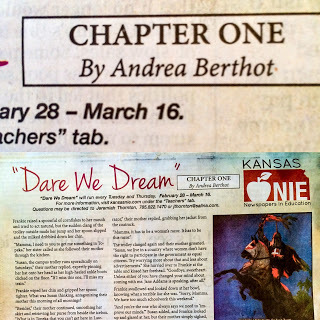
“Dare We Dream”Chapter OneFrankie raised a spoonful of cornflakes to her mouth and tried to act natural, but the sudden clang of the trolley outside made her jump and her spoon slipped and the milked dribbled down her chin.“Mamma, I need to you to get me something in Topeka,” her sister called as she followed their mother through the kitchen.“Susan, the campus trolley runs sporadically on Saturdays,” their mother replied, expertly pinning her hat onto her head as her high-heeled ankle boots clicked on the floor. “If I miss this one, I’ll miss my train.”Frankie wiped her chin and gripped her spoon tighter. What was Susan thinking, antagonizing their mother this morning of all mornings? “Besides,” their mother continued, smoothing her skirt and retrieving her purse from beside the icebox. “What is in Topeka that you can’t get here in Lawrence?”“This,” Susan replied, holding up a copy of Harper’s Bazaar and showing their mother a page Frankie couldn’t see from the table. Their mother paused and squinted at it.“A razor?” she asked. “What on earth do you need a razor for?”Susan groaned. “It says right there, Mamma. ‘For the removal of objectionable underarm hair.’”Their mother’s eyes widened at Susan’s use of the word “underarm,” and Frankie’s aggravation gave way to curiosity. She stood from the table and craned her neck to see the advertisement. It featured a woman in a slip-like, sleeveless dress with her arms up over her head and her underarms totally bare.“This is how women in big cities are dressing now,” Susan said. “You can’t wear a sleeveless dress without shaving your underarm hair.”Their mother lifted her gaze and narrowed her eyes. “Youcan’t wear a sleeveless dress, period, Susan. Not while you live in this house.”“Mamma, it’s nineteen-fifteen. Times are changing,” Susan argued, and Frankie sat down and closed her eyes, willing her to be quiet. “I’ll be seventeen next week,” Susan continued. “I’m practically grown.” “If you insist on mutilating yourself, use your father’s razor,” their mother replied, grabbing her jacket from the coatrack.“Mamma, it has to be a woman’s razor. It has to be this razor.”The trolley clanged again and their mother groaned. “Susan, we live in a country where women don’t have the right to participate in the government as equal citizens. Try worrying more about that and less about advertisements.” She hurried over to Frankie at the table and kissed her forehead. “Goodbye, sweetheart. Unless either of you have changed your mind about coming with me. Jane Addams is speaking, after all.”Frankie swallowed and looked down at her bowl, knowing what a terrible liar she was. “Sorry, Mamma. We have too much schoolwork this weekend.”“And you’re the one who always says we need to ‘improve our minds,’” Susan added, and Frankie looked up and glared at her, but their mother simply sighed, walked back to Susan, and kissed her as well.“Be good, girls,” she called as she rushed out the door. “I’ll see you tonight.”The screen door clattered shut as their mother sped down the porch steps. Frankie stood, glanced out the door, and watched as she made the trolley.“Why did you have to bring that up today?” she demanded of Susan.“If I hadn’t acted normal, she would have known something was wrong,” Susan replied. “And I am going to get that razor. I don’t care what she says.”Frankie snorted. “What else would you shave if some magazine told you to, Susan? Your arms? Your legs?”“Just because you’re only fourteen and don’t have any underarm hair yet.”“I do too,” Frankie countered, her face flushing. She did. A little.“Oh, who cares?” Susan said, smiling as she picked up Frankie’s bowl and carried it to the sink. “Everything worked out perfectly.”Frankie took a deep breath and nodded. They had waited for an opportunity in which their mother and father would both be gone all day for two months now. With Mamma at her suffrage rally in Topeka, and their father – a KU geology professor – still at a fossil dig in the Smoky Hills, they could take their own train to the Missouri side of Kansas City and see the film their parents had forbidden them to see.The film that had been banned in the entire state of Kansas.“You’re right,” Frankie said, her heart picking up speed as she wiped her mouth and sat her napkin down. “Come on. Let’s go.”
So, without further ado, here is the first section of "Dare we Dream."

“Dare We Dream”Chapter OneFrankie raised a spoonful of cornflakes to her mouth and tried to act natural, but the sudden clang of the trolley outside made her jump and her spoon slipped and the milked dribbled down her chin.“Mamma, I need to you to get me something in Topeka,” her sister called as she followed their mother through the kitchen.“Susan, the campus trolley runs sporadically on Saturdays,” their mother replied, expertly pinning her hat onto her head as her high-heeled ankle boots clicked on the floor. “If I miss this one, I’ll miss my train.”Frankie wiped her chin and gripped her spoon tighter. What was Susan thinking, antagonizing their mother this morning of all mornings? “Besides,” their mother continued, smoothing her skirt and retrieving her purse from beside the icebox. “What is in Topeka that you can’t get here in Lawrence?”“This,” Susan replied, holding up a copy of Harper’s Bazaar and showing their mother a page Frankie couldn’t see from the table. Their mother paused and squinted at it.“A razor?” she asked. “What on earth do you need a razor for?”Susan groaned. “It says right there, Mamma. ‘For the removal of objectionable underarm hair.’”Their mother’s eyes widened at Susan’s use of the word “underarm,” and Frankie’s aggravation gave way to curiosity. She stood from the table and craned her neck to see the advertisement. It featured a woman in a slip-like, sleeveless dress with her arms up over her head and her underarms totally bare.“This is how women in big cities are dressing now,” Susan said. “You can’t wear a sleeveless dress without shaving your underarm hair.”Their mother lifted her gaze and narrowed her eyes. “Youcan’t wear a sleeveless dress, period, Susan. Not while you live in this house.”“Mamma, it’s nineteen-fifteen. Times are changing,” Susan argued, and Frankie sat down and closed her eyes, willing her to be quiet. “I’ll be seventeen next week,” Susan continued. “I’m practically grown.” “If you insist on mutilating yourself, use your father’s razor,” their mother replied, grabbing her jacket from the coatrack.“Mamma, it has to be a woman’s razor. It has to be this razor.”The trolley clanged again and their mother groaned. “Susan, we live in a country where women don’t have the right to participate in the government as equal citizens. Try worrying more about that and less about advertisements.” She hurried over to Frankie at the table and kissed her forehead. “Goodbye, sweetheart. Unless either of you have changed your mind about coming with me. Jane Addams is speaking, after all.”Frankie swallowed and looked down at her bowl, knowing what a terrible liar she was. “Sorry, Mamma. We have too much schoolwork this weekend.”“And you’re the one who always says we need to ‘improve our minds,’” Susan added, and Frankie looked up and glared at her, but their mother simply sighed, walked back to Susan, and kissed her as well.“Be good, girls,” she called as she rushed out the door. “I’ll see you tonight.”The screen door clattered shut as their mother sped down the porch steps. Frankie stood, glanced out the door, and watched as she made the trolley.“Why did you have to bring that up today?” she demanded of Susan.“If I hadn’t acted normal, she would have known something was wrong,” Susan replied. “And I am going to get that razor. I don’t care what she says.”Frankie snorted. “What else would you shave if some magazine told you to, Susan? Your arms? Your legs?”“Just because you’re only fourteen and don’t have any underarm hair yet.”“I do too,” Frankie countered, her face flushing. She did. A little.“Oh, who cares?” Susan said, smiling as she picked up Frankie’s bowl and carried it to the sink. “Everything worked out perfectly.”Frankie took a deep breath and nodded. They had waited for an opportunity in which their mother and father would both be gone all day for two months now. With Mamma at her suffrage rally in Topeka, and their father – a KU geology professor – still at a fossil dig in the Smoky Hills, they could take their own train to the Missouri side of Kansas City and see the film their parents had forbidden them to see.The film that had been banned in the entire state of Kansas.“You’re right,” Frankie said, her heart picking up speed as she wiped her mouth and sat her napkin down. “Come on. Let’s go.”
Published on February 28, 2017 07:54
November 16, 2016
Creating Characters Based on Real People
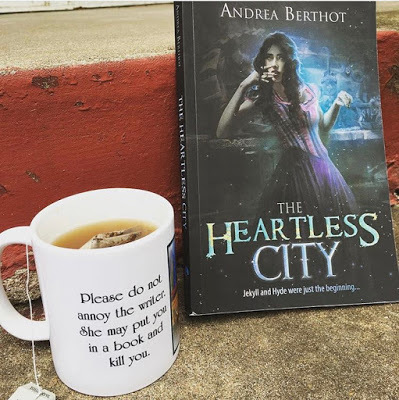
For Christmas last year, my mother gave me a mug that said, “Please, do not annoy the writer. She may put you in a book and kill you.” In a sense, we writers are the gods of our own little worlds. We give life to our characters and we have the power to take it. Personally, I have never put a person who annoyed me in a book simply for the cathartic pleasure of killing them off. Yet. In fact, I have only once created a character based on a real person. She started out as a minor character in The Heartless City, but ended up being so awesome she demanded her own book as well. So, I thought I would write a post about my experience with basing a character on a real person and how it took my writing in a surprising and new direction. The Heartless City is set in an alternate Victorian London that has been quarantined due to an infestation of monsters known as Hydes, making the already dark, patriarchal setting even more oppressive. I was about a third of the way through and had most of the plot and characters mapped out when I happened to go see my sister in a community theatre show. I’ve been involved in theatre my whole life, along with the rest of my family, and the Salina Community Theatre is sort of our home away from home. So, I already knew this fifteen-year-old girl who was in the show with my sister. I’d admired and even adored her since I met her. She was the tiniest little thing with the biggest talent and personality I had ever encountered. She was fierce, forward, honest, brave, and prepared to conquer the world, and I thought, “OMG, this girl would HATE living in my book.” As Gru in Despicable Me would say, “Light Bulb.” I asked her if she would mind if I put a character based on her in my book, and she said no. I’d never done anything like that before and wasn’t sure how it would play out, but it ended up being an almost magical experience. I named the character Philomena, and once she was inside the story, she took on a life of her own. She had the appearance, attitude, and behaviors of the girl I knew, but because she had a vastly different background – growing up as an aristocrat trapped in Buckingham Palace during a monstrous quarantine – she was also her very own, and very different, person. I had never planned to write a sequel to The Heartless City, but once it ended, I knew Philomena needed her own story. The Hypnotic City, which is a standalone as well as a sequel, was born, and this time, Philomena was the star. Both novels have now been published, and I’m currently writing the third book in a series that began with a story I’d thought would end in one. And all because of a girl in a community theatre show. That girl is now in her first year of college, pursing a degree in musical theatre. My parents actually saw her in a show there just last weekend (and I would have gone if I hadn’t been directing my own show at the same time). I won’t say whether or not I kill her in the books (no spoilers!), but a lot of people HAVE been annoying me lately (mostly due to the smoldering trash fire that was the 2016 election), so who knows what the future holds. Mwahahahah…
Published on November 16, 2016 04:54
August 7, 2016
The Hypnotic City Dream Cast
So, here is my official "dream cast" for The Hypnotic City!
Philomena: Chloe Grace Moretz
She's 5'4", so she isn't QUITE short enough, but she has the perfect Philomena face, she can sing, AND if you've seen Hugo, you know she can pull of an English accent. In fact, when she auditioned for Hugo, she fooled Martin Scorsese into thinking she was actually English, and being good with accents is a major talent of Philomena's.

 Jamie: Darren Criss
Jamie: Darren Criss
I think Darren Criss may have been somewhere in the back of my mind when I first created Jamie. It's almost sad Jamie doesn't sing in the book because Lord is Darren's voice gorgeous. Plus...just look at him...(heart eyes).
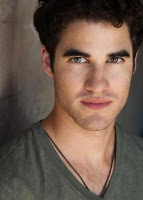
Jennie: Lily James
In my Heartless City dream cast, I had someone else cast as Jennie, but that was before I discovered Lily James, who is 100% PERFECT. (And Jennie, as a former maid, has a lot in common with Cinderella)


Sebastian: Jonathan Groff
Like Darren Criss, I think, at least subconsciously, I pictured Jonathan Groff as Sebastian even while I was writing. He is beautiful, talented, and has the perfect sense of humor. And it's also too bad his character doesn't sing.


Flo: Daisy RidleyBonnie: Dove Cameron
Both of these actresses deserve way bigger parts than Bonnie and Flo (who, yes, are often a pair in the book) but they are also perfect, so I had to dream cast them here. :)
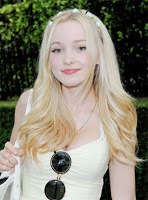

Tom: Tom Hiddleston
It's not just the first name. Tom Hiddleston has the ability to encompass everything about Tom Casey, especially the ability to look like he was born in a tailored suit.
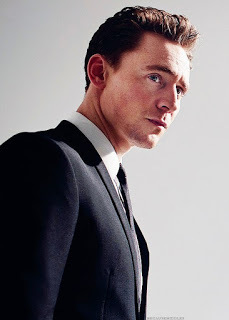

So, what do you think of the cast? What would you change? Who else would you like to see?
Philomena: Chloe Grace Moretz
She's 5'4", so she isn't QUITE short enough, but she has the perfect Philomena face, she can sing, AND if you've seen Hugo, you know she can pull of an English accent. In fact, when she auditioned for Hugo, she fooled Martin Scorsese into thinking she was actually English, and being good with accents is a major talent of Philomena's.

 Jamie: Darren Criss
Jamie: Darren CrissI think Darren Criss may have been somewhere in the back of my mind when I first created Jamie. It's almost sad Jamie doesn't sing in the book because Lord is Darren's voice gorgeous. Plus...just look at him...(heart eyes).


Jennie: Lily James
In my Heartless City dream cast, I had someone else cast as Jennie, but that was before I discovered Lily James, who is 100% PERFECT. (And Jennie, as a former maid, has a lot in common with Cinderella)


Sebastian: Jonathan Groff
Like Darren Criss, I think, at least subconsciously, I pictured Jonathan Groff as Sebastian even while I was writing. He is beautiful, talented, and has the perfect sense of humor. And it's also too bad his character doesn't sing.


Flo: Daisy RidleyBonnie: Dove Cameron
Both of these actresses deserve way bigger parts than Bonnie and Flo (who, yes, are often a pair in the book) but they are also perfect, so I had to dream cast them here. :)


Tom: Tom Hiddleston
It's not just the first name. Tom Hiddleston has the ability to encompass everything about Tom Casey, especially the ability to look like he was born in a tailored suit.


So, what do you think of the cast? What would you change? Who else would you like to see?
Published on August 07, 2016 14:34
July 25, 2016
Writing About Your Passions

Since The Hypnotic City comes out ONE WEEK FROM TODAY, I thought I would make a blog post about writing about one's passions, as one of the major elements of the book is musical theatre.
And I am PASSIONATE about musical theatre.
I often wonder when I'm reading a book where the characters are pursuing a sport, a hobby, or a certain career, if the author also has a passion for or experience with that activity. In The Heartless City, Elliot had a passion for painting and Iris had a passion for ornithology (the study of birds), and I had to do research on both, because neither thing is a passion of mine. I also had to do research for the historical aspects of The Hypnotic City, but as far as Philomena's passion for singing and acting went, I was already prepared.
I've loved theatre since I was a kid. My parents owned just about every movie musical on VHS (the old Rogers and Hammerstein classics, every Barbra Streisand movie, etc), we listened to musical soundtracks in the car, and we went to see live shows at the high schools in town and the Salina Community Theatre. As soon as I was old enough, I started taking acting classes and trying out for shows there as well. SCT had and still has an AMAZING youth program. My brother and sister and I went to their camps and performed in their shows every summer. Eventually, my parents joined in as well, and a couple of times all five of us were in the same show together. I continued doing shows in high school and college and even majored in performance for a while. Now my parents and sister still do shows at SCT, my sister choreographs and teaches dance there, my brother is a musician on cruise ships, and I direct high school shows and teach drama as well as English and creative writing. I've also been lucky enough to visit New York and see many Broadway shows, so that aspect of The Hypnotic City came easily to me.
So what about you guys? Do you like reading books about activities you enjoy? And fellow writers, have you ever gotten the chance to write about one of your passions (other than writing)? I know I will always treasure this book especially for that reason.
Published on July 25, 2016 07:59
July 21, 2016
Five Fantastic Female Stories
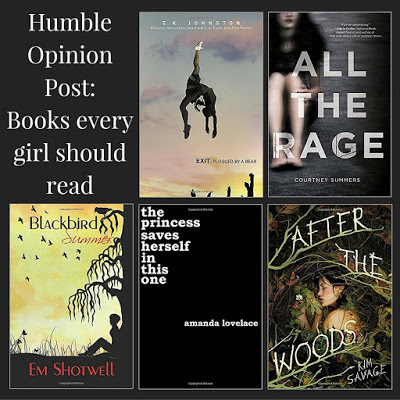
In a world (or at least, the country I live in) that seems to be more and more accepting of sexism every day, I was so happy to read an amazing number of books with fantastic messages about women, gender equality, and tolerance/decent human respect in general this year. I can think of nothing better than for young people of any gender identity or orientation to read these books, so I'm going to give a short description of each, because I want the entire world to know these wonderful stories exist.
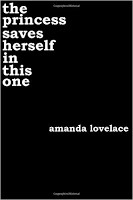
The Princess Saves Herself in This One by Amanda Lovelace
It's strange that I'm starting with a book of poetry, because it isn't normally what I read. Like a lot of people, I picked this book up because I follow lady bookmad on Tumblr (and now on Instagram and Twitter as well) and loved her blog so much I had to read her poetry. The book is short, deeply personal, and unabashedly feminist. It made me laugh and brought me to tears and more than anything else made me feel so damn empowered. I can't wait to read more from Amanda Lovelace.
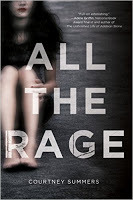
All The Rage by Courtney Summers
This was one of the most talked about feminist YA books of the year, and deservedly so. It takes a hard and unflinching look at the problem of rape culture. At times, it was hard to read because of the ugly truths is it revealed, but it's absolutely beautiful and ultimately uplifting and I recommend it to everyone.
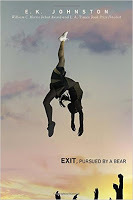
Exit, Pursued by a Bear by E.K. Johnston
This story also concerns the subject of rape, but it is presented in an entirely different way and is one of the most different and original books I've read. It's also based on a Shakespeare play, and Shakespeare re-tellings always have a special place in my heart. The main thing that's different about this book is that it shows how everything can be done right in the wake of a rape. It centers around a cheerleader who is incredibly strong and well-developed and in no way a stereotype, and her amazing support system of women and men who help her after the attack. I can truly say it's one of the best books I have ever read.
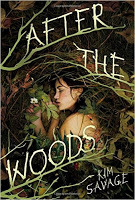
After The Woods by Kim Savage
This book is about something that usually doesn't happen. A girl get abducted by a man in the woods (after sacrificing herself to save her best friend from him), and manages to come out alive. The book is about the girl's life a year later as she deals with what happened and unravels the mystery of what started it all in the first place. But the thing that made this book stand out for me was its focus on the power women have to harm each other. Mothers and daughters, best friends, and even acquaintances and strangers. It's like a cautionary tale of how not to treat your fellow woman.
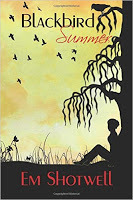
Blackbird Summer by Em Shotwell
This is another book and a genre I don't normally read, since it is NA rather than YA. But it also has everything else I usually love: suspense, romance, magic, and unique setting, so I had to read it, and I'm SO glad I did. Blackbird Summer is a suspenseful mystery/thriller about misfits and underdogs in general, but at its heart it is also about some freaking strong, southern women. The story is full of richly drawn, well-developed characters, and the men are also fantastic, but the network of powerful, beautiful women who stick together and help each other was one of my favorite parts. I can't recommend it enough and I can't wait for the sequel.
So what are some books with great messages about women you've read this year? I can never get my hands on enough. And, more than anything, I hope the books I write fall into this category as well.
Published on July 21, 2016 08:38



